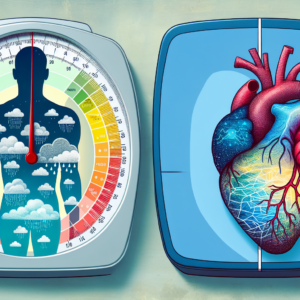Losing weight can be a challenging journey, but understanding the common mistakes people make along the way can make all the difference. From crash diets to overexercising, the pursuit of shedding those extra pounds can often lead individuals down the wrong path. In this article, you’ll discover some of the most prevalent missteps individuals make when trying to lose weight, allowing you to avoid these pitfalls and achieve your desired results in a healthier and more sustainable manner.
Lack of realistic goals
Losing weight is a common goal for many people, but it’s important to set realistic targets. One of the most common mistakes people make is setting unrealistic weight loss targets. It’s tempting to want to lose a large amount of weight quickly, but this can be detrimental to your overall health. Remember, healthy weight loss is a gradual process, and aiming to lose 1-2 pounds per week is considered safe and realistic.
Another mistake is focusing too much on the numbers on the scale instead of overall health. While the number on the scale can be a helpful tool for tracking progress, it’s important to remember that weight is not the sole indicator of health. Your overall health should be the main focus, including factors like body composition, energy levels, and mental well-being.
Expecting quick and drastic results is another common mistake. Crash diets or extreme measures may lead to initial weight loss, but they are rarely sustainable in the long run. It’s important to create lasting habits and make sustainable changes to your lifestyle rather than simply looking for a quick fix.
Skipping meals
Skipping meals is a mistake that many people make when trying to lose weight. Breakfast, often referred to as the most important meal of the day, is frequently skipped in the hopes of saving calories. However, this can actually backfire and lead to overeating later in the day, as well as a lack of energy and focus.
Avoiding snacks is another mistake commonly made. Snacks can be an important part of a balanced and healthy diet, as they can help regulate blood sugar levels and prevent overeating during meals. If you find yourself hungry between meals, opt for nutritious snacks like fruits, vegetables, or nuts.
Skipping lunch or dinner is another mistake. While it may seem logical to skip meals to reduce calorie intake, it can actually slow down your metabolism and hinder weight loss efforts. It’s important to fuel your body with balanced meals throughout the day to maintain energy levels and support overall health.

Relying solely on diets
Many people fall into the trap of relying solely on diets when trying to lose weight. Adopting fad diets is a common mistake that often leads to initial weight loss followed by weight gain once the diet is abandoned. Fad diets are typically restrictive and unsustainable, and they can also lead to nutrient deficiencies.
Eliminating entire food groups is another mistake often made. While certain diets may promote cutting out specific food groups, it’s important to remember that each food group provides essential nutrients that contribute to overall health. It’s important to have a balanced and varied diet that includes fruits, vegetables, lean proteins, whole grains, and healthy fats.
Over-restricting calorie intake is yet another mistake. While it’s important to create a calorie deficit to lose weight, excessively restricting calorie intake can be harmful to your health. It can lead to nutrient deficiencies, low energy levels, and a slower metabolism. It’s crucial to find the right balance between calorie reduction and meeting your body’s nutritional needs.
Neglecting portion control
Portion control plays a significant role in weight loss, but many people neglect this aspect. Eating large portion sizes is a common mistake that can lead to consuming more calories than your body needs. It’s important to be mindful of serving sizes and listen to your body’s hunger and fullness cues.
Ignoring calorie density is another mistake. Some foods are more calorie-dense than others, meaning they contain a high number of calories in a small portion size. By ignoring calorie density and focusing solely on the volume of food, you may inadvertently consume more calories than you intended. It’s important to pay attention to both portion sizes and calorie density to effectively manage your calorie intake.
Not measuring or tracking food intake is a mistake that can hinder weight loss progress. Without measuring or tracking your food intake, it’s challenging to accurately monitor your calorie and nutrient intake. Keeping a food diary or using a tracking app can help you become more aware of your eating habits and make necessary adjustments.

Not incorporating exercise
Physical activity is crucial for overall health and weight management, but many people underestimate its importance when trying to lose weight. Underestimating the importance of physical activity is a common mistake that can hinder weight loss progress. Exercise not only burns calories but also helps maintain muscle mass, boosts metabolism, and improves overall well-being.
Not following a consistent exercise routine is another mistake. Consistency is key when it comes to exercise, and sporadic workouts won’t yield optimal results. It’s important to establish a regular exercise routine that includes a combination of cardiovascular exercises, strength training, and flexibility exercises. Aim for at least 150 minutes of moderate-intensity aerobic activity per week and two or more days of strength training.
Choosing ineffective or unsustainable workouts is yet another mistake. It’s important to find activities that you enjoy and that are sustainable in the long run. This will increase adherence and make exercise a more enjoyable part of your weight loss journey. Experiment with different forms of exercise until you find what works best for you.
Relying on weight loss supplements
Weight loss supplements are often marketed as quick fixes, but relying solely on them is a mistake. Believing in magical weight loss pills is a common misconception. While some supplements may assist with weight loss to a certain extent, they are not a replacement for a healthy diet and regular exercise. Be wary of marketing claims and always consult a healthcare professional before starting any supplement.
Depending solely on supplements for results is another mistake. Supplements should be used as an adjunct to a healthy lifestyle, not a substitution. They should complement a balanced diet and regular exercise routine. Remember, there is no magic pill for weight loss, and sustainable results require commitment to a healthy lifestyle.
Not consulting a healthcare professional before starting weight loss supplements is another mistake. It’s important to seek professional guidance before incorporating any supplements into your routine. A healthcare professional can assess your specific needs, evaluate the safety and effectiveness of the supplement, and provide tailored recommendations.

Ignoring emotional eating triggers
Emotional eating is a common obstacle when trying to lose weight, and many people neglect to address this issue. Using food as a coping mechanism is a mistake that can derail your weight loss journey. It’s important to recognize and address emotional triggers that may lead to excessive or mindless eating. Finding alternative coping mechanisms like exercise, journaling, or talking to a trusted friend can help break the cycle of emotional eating.
Eating mindlessly or out of boredom is another mistake. It’s easy to fall into the habit of mindless eating, especially when distracted or bored. Paying attention to your eating patterns and practicing mindful eating can help you become more aware of your hunger and fullness cues. Take the time to savor your food, eat slowly, and listen to your body’s signals.
Failing to address underlying emotional issues is yet another mistake. Emotional eating is often linked to underlying emotional issues that need to be addressed. If you find yourself using food as a comfort or coping mechanism regularly, consider seeking support from a therapist or counselor who can help you navigate and resolve these emotional triggers.
Lacking consistency and commitment
Consistency and commitment are crucial for successful weight loss, but many people struggle in these areas. Starting and stopping weight loss efforts frequently is a common mistake that can hinder progress. It’s important to develop a mindset of long-term change and commit to sustainable habits rather than engaging in yo-yo dieting. Consistency over time is key to achieving and maintaining weight loss goals.
Not adhering to healthy habits long-term is another mistake. Weight loss is not a temporary fix but rather a lifestyle change. It’s important to make sustainable changes to your eating habits and incorporate regular physical activity into your routine. Set realistic goals and focus on creating healthy habits that you can maintain in the long run.
Losing motivation and giving up easily is yet another mistake. Weight loss journey is not always smooth sailing, and it’s common to face obstacles and setbacks along the way. It’s important to stay motivated and resilient, even when progress is slow or you experience temporary setbacks. Surround yourself with a support system, celebrate small victories, and remind yourself of your reasons for wanting to lose weight.
Insufficient sleep
Sleep is often overlooked when it comes to weight loss, but it plays a crucial role in overall health and weight management. Neglecting the importance of quality sleep is a mistake. Lack of sleep can disrupt the body’s natural hormonal balance, leading to increased hunger and cravings, especially for high-calorie, sugary foods. Aim for 7-9 hours of quality sleep per night to support your weight loss efforts.
Disrupting the body’s natural hormonal balance is another consequence of insufficient sleep. Lack of sleep can disrupt the balance of hormones that regulate hunger, satiety, and metabolism, leading to increased appetite and slower weight loss. Prioritize your sleep health by establishing a consistent sleep schedule, creating a relaxing bedtime routine, and optimizing your sleep environment.
Increased cravings and hunger due to lack of sleep is yet another consequence. When you’re sleep-deprived, your body craves extra energy to compensate for the lack of rest. This can result in increased cravings for unhealthy foods and a tendency to overeat. By prioritizing quality sleep, you can better regulate your appetite and reduce the likelihood of succumbing to these cravings.
Over-reliance on processed and convenience foods
Diet plays a major role in weight loss, and many people make the mistake of relying too heavily on processed and convenience foods. Choosing pre-packaged and fast food options is a common mistake that can hinder weight loss progress. These foods are often high in calories, unhealthy fats, and added sugars, making it difficult to maintain a calorie deficit. Aim to include fresh, whole foods in your diet as much as possible.
Ignoring nutritional value in favor of convenience is another mistake. Processed and convenience foods are often lacking in essential nutrients and contain additives that can negatively impact health. It’s important to prioritize the nutritional value of foods and opt for minimally processed options whenever possible. Make time for meal planning and preparation to ensure you have nutritious meals and snacks readily available.
Consuming hidden sugars, unhealthy fats, and additives is yet another consequence of over-relying on processed and convenience foods. These foods are often packed with hidden sugars, unhealthy fats, and additives that can contribute to weight gain and negatively affect overall health. Read food labels carefully and choose whole, unprocessed options to minimize your intake of these harmful ingredients.
In conclusion, when embarking on a weight loss journey, it’s important to avoid common mistakes that can hinder progress. Set realistic goals, prioritize overall health over numbers on the scale, and expect gradual, sustainable results. Avoid skipping meals, rely on a balanced diet rather than fad diets, practice portion control, incorporate regular exercise, consult professionals before relying on supplements, address emotional eating triggers, prioritize consistency and commitment, prioritize quality sleep, and reduce reliance on processed and convenience foods. By avoiding these mistakes and adopting healthy and sustainable habits, you can achieve your weight loss goals and maintain a healthier lifestyle in the long run.






